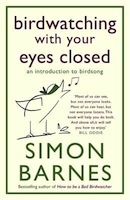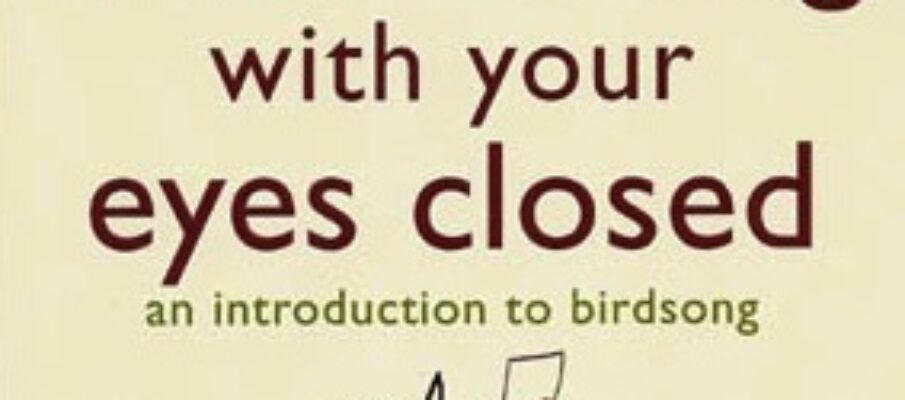 Back in the late autumn of 2004, I stumbled across a mention of a new book by a fellow of whom at that time I had only recently heard – Simon Barnes. Not being much of a sports enthusiast and The Times – in which publication he has long written on the subject and for which he has now risen to the position of chief sportswriter – not being sold within fifty miles of my rural Oregon home (and only then at a downtown Portland tobacconist who made it a point of pride, if not good business, to carry many of the world’s major newspapers, despite their appearance on his shelves usually being a week or two following their publication) I had no previous knowledge of him or his work. However after reading this aforementioned book, How to be a Bad Birdwatcher; To the Greater Glory of Life, his name became not only one I thereafter spoke in tones of respect but one I hoped would find its way onto the cover a future volume on the same subject.
Back in the late autumn of 2004, I stumbled across a mention of a new book by a fellow of whom at that time I had only recently heard – Simon Barnes. Not being much of a sports enthusiast and The Times – in which publication he has long written on the subject and for which he has now risen to the position of chief sportswriter – not being sold within fifty miles of my rural Oregon home (and only then at a downtown Portland tobacconist who made it a point of pride, if not good business, to carry many of the world’s major newspapers, despite their appearance on his shelves usually being a week or two following their publication) I had no previous knowledge of him or his work. However after reading this aforementioned book, How to be a Bad Birdwatcher; To the Greater Glory of Life, his name became not only one I thereafter spoke in tones of respect but one I hoped would find its way onto the cover a future volume on the same subject.
My hopes were, in fact, realized roughly a year later with the publication of his A Bad Birdwatcher’s Companion; Or a Personal Introduction to Britain’s 50 Most Obvious Birds. In this book, I found the same rare combination of seriousness and good humor, passion and playfulness that I had in the first; a combination that had established him in my mind as not only a natural history writer worthy of respect but as a fellow enthusiast for one of the world’s most patently mad yet spiritually enriching past-times: bird watching.
Now, with the publication of his third book on the subject (he has, it must be noted, written many more on other topics both closely related to and vastly different from the observation of the planet’s birdlife), Birdwatching With Your Eyes Closed; An Introduction to Birdsong, he continues to bring his unique combination of professional experience and amateur enthusiasm to a very wide potential readership; one that includes not only bird watchers of all levels of experience but, more importantly perhaps, those who don’t necessarily even consider themselves bird watchers but do, however, possess that – pardon the pun – natural curiosity with which we are all born but of which we are too often robbed by the myriad demands of modern life.
The premise of Birdwatching With Your Eyes Closed is a simple one: in our far distant past we depended upon our ability to recognize bird vocalizations for, not to put too fine a point on it, our very survival. Few of us have such a critical need to do so today yet all of us can regain at least some of the knowledge our ancestors had; in fact, we still do possess it without often realizing it. Rather than dive immediately into the deep end of the proverbial pool, Mr. Barnes brings us to understand, through reference to bird songs and calls we likely already know at a generic level – crow, duck, pigeon – as well as a few that are more or less ubiquitous if not by their song then at least by their permeation of the culture – Robin, Wren, Dunnock – that we not only can learn to identify the calls of the birds all around us whenever we step outside but that for the sake of the vast enrichment of our lives we should. However this last is not a point he makes through pontificating, preaching or belaboring the point; he does so rather through something more akin to the gentle encouragement of a friend who knows you to be capable of something that you really should be doing for your own good and sets about seeing you through to it with humor and fellow-feeling.
Now, as you might have asked yourself by now, and if you haven’t this would be a perfect time to do so, how can one possibly learn to identify all the tweets, chirps, whistles, clicks, mews, and rattles that birds produce in a bewildering variety of combinations from reading a book? After all, be they ever-so-carefully transcribed, the various explanations of them in field guides barely serve to remind those already familiar with them how the various songs and calls of birds actually sound. Which is why, despite how effectively Mr. Barnes conveys the feeling of the songs and calls of the birds about which he writes, he employs a freely available podcast to enable his readers to hear the sounds of which human language is at a loss as to be able to describe.
Finally, lest anyone get the wrong idea that Birdwatching With Your Eyes Closed is simply about learning to identify bird vocalizations, it must be pointed out that it is far from what would, were it so, be such a dry text. Even the most talented of popular natural history writers, among which Mr. Barnes has clearly shown himself to be counted, could not succeed in writing an enjoyable book that was merely the explanation of one species’ songs and calls after another; which is why, interwoven between each chapter in which he muses upon the vocalizations of a particular species of bird are one or more chapters on everything from why birds make the sounds they do, to how they do it, to what it has meant to the lives of our ancestors both ancient and recent, as well as to ourselves today.
Thus it should by this time go without saying that Birdwatching With Your Eyes Closed is a book that should be on the reading tables of all those Britons with any level of interest in birds or natural history (and judging by the distinguished history of such in both the depth and breadth of the subject that should be just about every last one). However should you not be lucky enough to be in England when April, or any other month for that matter, is there and find yourself thinking that, as it is a book specifically addressing the songs and calls of British birds that it may not be particularly relevant to you, I would ask you to reconsider. While the birds about which Mr. Barnes has written are indeed the heart of the British List, it is what he has written about them, how he has reached deep into the subject of what it is to be a bird not only in the UK but throughout the world, not only in the present day but into the distant past, and what it is to hear them as a human being that makes the book transcend the species themselves. To read Birdwatching With Your Eyes Closed is to learn about not just what you hear but how to listen – and why; knowledge as free of, and unrestrained by, political or geographic boundaries as the lives of many of the birds about which Mr. Barnes so passionately writes.
 Book Title: Birdwatching With Your Eyes Closed; An Introduction to Birdsong
Book Title: Birdwatching With Your Eyes Closed; An Introduction to Birdsong
Author: Simon Barnes
Publisher: Short Books
Format: Clothbound
ISBN: 9781907595479
Published: 3 November 2011
In accordance with Federal Trade Commission 16 CFR Part 255, it is disclosed that the copy of the book read in order to produce this review was provided gratis to the reviewer by the publisher.

